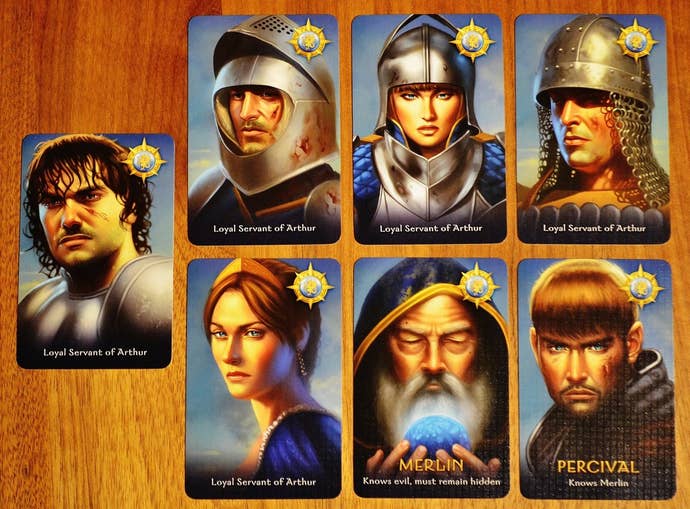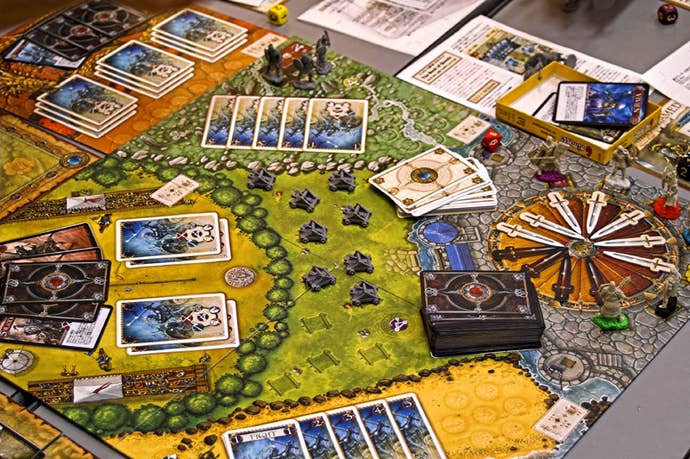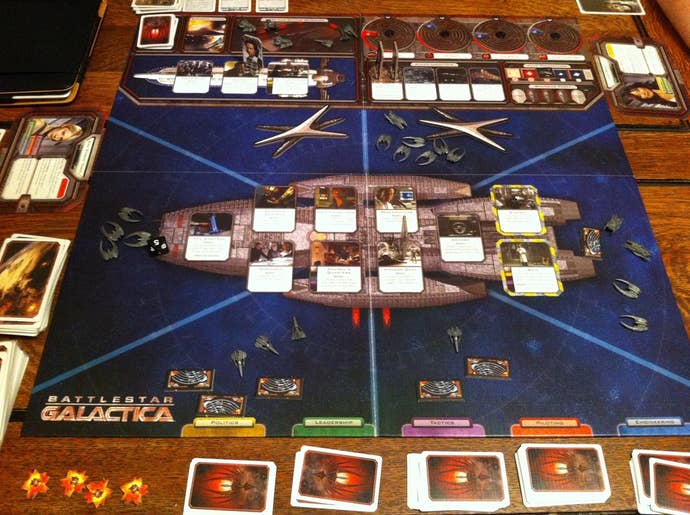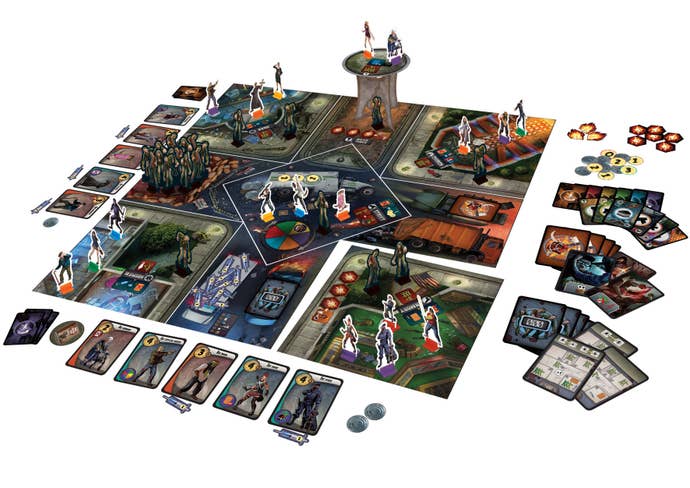BOARDgamer: Traitorous Titles to Strain the Strongest Friendships
Some games are outright competitive. Others are purely cooperative. And then there's games that occupy a curious middle-ground -- games that will get you eyeing the person sitting next to you somewhat warily. Pete explores four of the best.
This article first appeared on USgamer, a partner publication of VG247. Some content, such as this article, has been migrated to VG247 for posterity after USgamer's closure - but it has not been edited or further vetted by the VG247 team.
How much do you like your friends? If you're planning on bringing one of these titles to the table, it better be a lot, because these are games specifically designed around being thoroughly unpleasant to one another -- for some players, anyway.
I'm talking about an offshoot of purely cooperative games in which at least one of the people around the table is a "traitor" of some description. Implementations of how this works vary from game to game, but in many cases a "hidden role" mechanic is used in which the traitor must convince his comrades that he is a "good guy" for as long as possible before unleashing his full, evil powers in an attempt to win the game for the forces of darkness. It presents an interesting challenge for everyone involved in that they're not only competing against the game itself as in a pure co-op, but also attempting to uncover and defeat the traitorous player as quickly as possible.
I've got four games to share with you today; not all of them handle the concept of being a "traitor" in the manner mentioned above, but all of them are interaction-heavy games that are a great deal of fun when played with a group of close friends whom you know well. Just remember: what happens in the game stays in the game.
Avalon
Avalon is the follow-up to an earlier game called The Resistance and, mechanically, is almost identical. It's a simple game, suitable for playing with large numbers of people at parties and teaching to newcomers, but its complexity comes from how the people around the table interact with one another.
You're Knights of the Round Table and, presumably, you dance whenever able, but as well as that you're tasked with completing a number of quests on behalf of the kingdom. There are five quests to complete; if the forces of good successfully complete three of them, they might win -- more on that later -- while if the forces of evil successfully sabotage three of them, they win without question.
Before the game starts, each player is given a role card that determines whether they're good or evil. The main difference between Avalon and its earlier, future-themed counterpart The Resistance is that there are now specific characters involved rather than generic goodies and baddies, and these characters begin the game with specific pieces of knowledge. For example, Merlin, on the good side, always knows who the evil people are, and loyal knight Percival knows the two people who are Merlin and Morgana, but not who is who. All the evil players know who each other are, too, leaving the good players to work out who is loyal and who is traitorous. This knowledge is shared through a scripted sequence at the beginning of the game in which players open and close their eyes and put their thumbs up and down to silently reveal who they are to the various characters without making a sound. It's a clever mechanic that works well.

During the game, the role of "King" passes around the table one at a time. The King must select a number of people to go on the upcoming quest, and this number increases as the game progresses. Once the King has selected the team for the quest, all players vote to accept or reject the proposed party. If the majority accepts, the quest goes ahead; if the majority rejects, the kingship passes on and the next person tries again. If this happens five times, though, the evil players win regardless, so the forces of good will have to come to an agreement eventually.
Completing the quest is a simple matter of all the participants secretly choosing a "success" or "fail" card, and the results then being revealed in random order. In most cases, a single failure is enough to sabotage the quest and win it for evil, but depending on the number of players, evil may sometimes need more than one failure to prevail.
If the forces of good win three quests, the evil player with the Assassin role has one opportunity to point the finger at who they think Merlin is -- Merlin, remember, knew who all the evil players were from the start of the game, and thus will have been subtly attempting to disseminate this information without being spotted throughout the game -- and if they're successful, the forces of darkness clinch it at the last moment.
Avalon's an easy game to pick up and it's consistently exciting throughout. There's no player elimination, so everyone is constantly involved in the entire game, and even shy players will find themselves compelled to defend themselves when the accusations start flying. After a while, it becomes clear to most players that flinging baseless accusations and trusting no-one is not the way forward; instead, it's a matter of trying to gather information without giving the evil players too much of an advantage -- or, if you're evil yourself, trying to subtly undermine the negotiations without giving yourself away. Interaction is constant and enjoyable, and the game is done and dusted pretty quickly -- though most groups will almost certainly want to immediately give it another go.
Avalon seats 5-10 players and takes about 30 minutes to play.
Shadows Over Camelot
Sticking with the Knights of the Round Table theme, Shadows Over Camelot is another Arthurian adventure, though this time around it's a slightly more complex board game for fewer players than Avalon. Taking on the roles of several different characters, each with their own abilities, there's a chance that one player is a traitor and must subtly steer the game towards failure. The other players, meanwhile, are attempting to win the game by collecting enough white swords to have a majority around the Round Table.
There are a number of different mechanics in Shadows Over Camelot according to which of the game's quests you're participating in. Some quests require that you play combinations of numbered cards to beat a rival hand; others demand that you collect the appropriate cards to move the Holy Grail or Excalibur close to a position where it can be safely retrieved. Meanwhile, siege engines are gathering outside Camelot, and if the battlefield becomes overrun, the good players lose.

Like most co-op games, Shadows Over Camelot feels like a constant struggle against the board itself. Bad things happen one way or another every turn regardless of what the traitorous player -- if there is one -- is up to, and it's a matter of dealing with those things effectively. Certain characters have the ability to mitigate certain types of bad things happening, or predict the future by seeing what cards might come up next -- but there's always the risk a traitorous player might use these special abilities to their own advantage and lie about what's going to happen next.
Shadows Over Camelot is pleasingly, strongly thematic and, like most Days of Wonder games, is beautifully produced. There's a real feeling of struggling to defend the realm from the forces of darkness despite the somewhat abstracted mechanics in places, but it never feels like victory or failure is entirely determined by luck. Rather, it's a matter of preparing for the worst and then responding to situations as they come up. It's a challenge -- and your first few games will almost certainly end in defeat -- but it's an enjoyable one. Plus there are few things more satisfying than flipping over your character card with a booming laugh and proudly declaring yourself to be the traitor, at which point you can begin directly messing with the other players instead of working in secret.
Shadows Over Camelot seats 3-7 players and takes about 90 minutes to play.
Battlestar Galactica
Battlestar Galactica is, in some ways, a similar game to Shadows Over Camelot in that each player takes on the role of a character from the series, and there's the distinct possibility some of them might be traitors -- or, in this case, Cylons. Don't be fooled by a knowledge of the show, though; despite involving the same characters, the Cylon players are determined randomly, so there's no guarantee that someone who was a Cylon in the show will be one in the game.
Battlestar Galactica unfolds on an FTL-style board in which players move around the ship and complete various tasks. The ultimate aim is to make enough jumps to get home and survive, but along the way the crew of the Galactica must ensure that their population, fuel, food and morale stocks are kept topped up as well as deal with numerous Crises that show up following the draw of a card. These include skill challenges, in which players must play colored cards from their hand in sufficient quantities to overcome a particular challenge or suffer the consequences, and battle confrontations in which Galactica and its fleet of Vipers must fend off incoming Cylon forces.

The traitor mechanic in Battlestar Galactica blends elements of those seen in Shadows Over Camelot and Avalon; initially working in secret, the traitor must work to subtly sabotage the skill challenges and mess with the crew without being spotted, but there's a twist: crewmembers who distrust someone can throw them in the brig to keep them out of the way. When a Cylon player has had enough of pretending to be nice, they can unveil themselves, at which point they have the opportunity to do something unpleasant to the players every turn on top of the Crises they have to already deal with. In larger games, there might even be more than one Cylon at the table, so players who know they are loyal will have to watch what their comrades are up to very carefully indeed.
Battlestar Galactica is made by Fantasy Flight Games, which means a couple of things: beautifully produced components (and lots of them), and rules that initially seem a lot more complicated than they actually are. The skill check system around which much of the game is based is simple and elegant, and there's always a wonderful moment of tension when an obviously "wrong" card is flipped over, indicating that the traitor has probably involved themselves somewhere along the way. Even without the threat of the Cylons, though, Battlestar Galactica is a game full of tension and excitement without a single moment of downtime. Every turn there's something to respond to and something to do, and every character has something meaningful to contribute to the overall effort. It's a challenging, difficult game, but one that is a great deal of fun regardless of whether you win or lose -- and that's the sign of a truly great game.
Battlestar Galactica seats 3-6 players and takes 2-3 hours to play.
City of Horror
City of Horror is an interesting game in that it's not quite like the other titles on this list. Rather than being a full-on cooperative game with a single traitor, instead it's a game of uneasy alliances and lots of backstabbing.
The concept is simple. Taking on the role of one or more characters in a zombie apocalypse, it's your job to survive for four hours (game turns) until rescue arrives, at which point you'll score points for any survivors you've successfully vaccinated against the zombie virus (and who aren't dead, obviously) plus any food you've managed to acquire along the way.
Trouble is, there's not enough of anything for everyone to survive. Not enough medicine, not enough food, not enough safe spots to hide from the zombie hordes. And thus, slowly, the playable cast of characters are whittled down until there's only a few left.

City of Horror is a game about negotiation. It's a game about making deals with the other players and not feeling a moment's remorse when you go back on what you've agreed. It's a zombie apocalypse, after all; it's every man, woman and child for themselves. If you can't deal with the pack of zombies milling around outside the location your characters are in, there's a vote on who gets tossed out of the window and eaten. Ruthless.
The rules take a little learning to begin with -- there's all sorts of shenanigans with different turn phases, secret movement and individual characters' special abilities to come to terms with -- but once you've got your head around them, City of Horror is an utterly unique experience. Almost entirely dependent on social interaction, negotiation and, sometimes, outright bribery, the game has a limited random element and is less about luck than it is about playing the people around the table off against each other. It's not a game to be played with people who get easily offended or who hold grudges, because in order to succeed you will have to do some nasty things without remorse. You will have to blow up the city water tower even as you know two of your friends are standing atop it; you will have to steal that medicine supply from under your friend's nose; you will have to lie, cheat and steal your way to victory. And meanwhile, your "friends" will be doing the same to you.
City of Horror seats 3-6 players and takes about 90 minutes to play.
